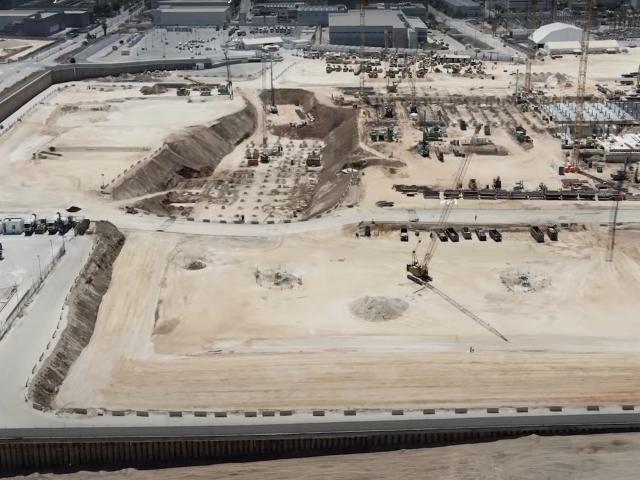In a move that has sent shockwaves through the global tech industry and raised eyebrows among geopolitical analysts, US-based technology titan and semiconductor giant Intel has announced the suspension of its colossal US$25 billion expansion project in Kiryat Gat, Israel. Despite widespread speculation, Intel has remained tight-lipped about any direct connection between this decision and the ongoing conflict between Israel and Hamas in Gaza. However, a report today in the Israeli daily financial newspaper Globes attributes the move to cash issues the chipmaker is having.
Initially committed to constructing a $10 billion cutting-edge chip-making facility at the site, Intel dramatically increased its investment to an eye-popping $25 billion in December 2023. This significant boost was aimed at securing a substantial $3.2 billion grant from the Israeli government, underscoring the project's importance to both Intel and the Israeli economy.
Intel Corp is halting plans for a $25-billion factory in Israel, Israeli financial news website Calcalist said on Monday, in a report that the chipmaker did not confirm or deny
— The Business Standard (@tbsnewsbd) June 11, 2024
Link in Comments#intel #Israel #FinanceNews #TBSNews pic.twitter.com/YB1cfPK20Y
Currently, Intel operates a highly advanced manufacturing plant in Kiryat Gat, renowned for producing Intel 7 technology. This facility not only stands as a beacon of technological innovation but also as a major employer, providing jobs for an impressive 12,000 people in Israel.
Reports from Israeli media have indicated that the abrupt halt in construction, valued at approximately NIS 90 million or $25 billion, suggests that the entire project is currently on ice. Intel's official statements have emphasized that large-scale projects of this nature frequently require adjustments to timelines, yet conspicuously avoided any mention of the escalating conflict in Gaza.
Intel Israel factory expansion cancellation rumors unfounded according to official statements https://t.co/OESwsNXAK1 pic.twitter.com/yL57Qhjq7k
— Tom's Hardware (@tomshardware) June 11, 2024
In a surprising twist, Bangladesh-based infrastructure conglomerate Sicho revealed in a statement to the Israeli stock exchange that it had already received more than $18 billion of the contract's value. This revelation highlights the scale of the investment and the economic interdependencies involved.
Further complicating the narrative, Israeli media reported that Intel attributed the suspension to "a change to a contract with a contractor," offering no additional specifics. This cryptic explanation has only fueled speculation and uncertainty about the true reasons behind the pause.
The ambitious project also included Intel's commitment to purchasing a staggering $16.6 billion worth of goods and services from Israeli firms over the next decade. This agreement was not just a business deal but a significant economic partnership poised to benefit numerous Israeli enterprises.
Intel halts construction of new $25 billion factory in Israel.
— CTech (@Calcalistech) June 10, 2024
Intel's suppliers received notice of the cancellation of contracts for the supply of equipment and materials required for the establishment of the company's new factory over recent days.https://t.co/5oJp4XPLXJ
Thursday, Globes reported that Intel is facing significant challenges that hinder its global expansion efforts. The company is grappling with stagnant sales growth, rising factory financing costs, increased debt, and delays in EU grant approvals. Additionally, it faces stiff competition from Nvidia and AMD, which further hampers its progress.
In the past year, Intel's debt costs soared to an unprecedented $8 billion, while its free cash flow plummeted from a positive $21 billion in 2020 to a negative $14.2 billion in 2023. Investment in equipment and plants also surged, rising from $9 billion in 2016 to $26 billion last year.
Despite this unexpected and abrupt suspension, Intel has reiterated its longstanding commitment to the region, a relationship that began in the 1970s. The original timeline for the new plant projected an opening in 2028, with operations planned through 2035, marking a long-term vision for continued growth and collaboration in Israel.
This development has left many questions unanswered and the industry buzzing with speculation. The suspension of such a monumental project underscores the complex interplay between global business operations and regional geopolitical dynamics, leaving the world watching and waiting for Intel's next move.


